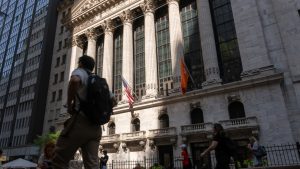The post-Labor Day borrowing frenzy kicked off Tuesday with a record 21 U.S. companies with investment-grade corporate ratings looking to borrow a total of about $35 billion in the bond market, according to portfolio managers.
While other days hold the record for the total amount borrowed, Tuesday was on pace to see the largest number of U.S. companies issue investment-grade corporate bonds in a single day, they said.
Caterpillar Financial Corp.
CAT,
Home Depot Inc.
HD,
Southern Company Gas Capital Corp.
SO,
and Waste Connections Inc.
WCN,
were among the slate of issuers wrangling for funding on Tuesday, the start of what is expected to be another blockbuster September for new debt financing.
Read: Big U.S. companies to kick off post Labor Day borrowing boom
“Yes, we knew this was coming,” said Matt Brill, Invesco Fixed Income’s head of North America investment-grade credit. “But it’s still a lot of deals.”
“You’re trying not to be too early, but you also don’t want to be too late,” Brill said, adding that even with bond managers making room for the typical deluge of September bond deals, you need to be “pretty picky” on selecting which issuers to buy, but without missing the window before issuance slows for the year.
“Really, this is your last chance to position your portfolio going into the fourth quarter, and into 2022,” Brill said.
Market conditions on Tuesday looked pretty favorable for corporate borrowers, with spreads narrowing roughly 15 to 20 basis points from levels circulated earlier in the morning, an indication of robust demand, despite a bit of rate volatility in Treasury yields.
Yields on the benchmark 10-year Treasury
TMUBMUSD10Y,
were about 4.8 basis points higher Tuesday, at about 1.37%, or around their highest level in about two months, as the government debt market faced some selling pressure in the first session after U.S. markets were closed in observance of Labor Day.
Rate volatility can throw a wrench in corporate-bond issuance, particularly if a heavy lineup of borrowers hits at once in a jittery market, resulting in unexpectedly higher borrowing costs for companies. But the rise in benchmark rates on Tuesday wasn’t deemed enough to sour the borrowing mood.
“It’s a pretty normal first day back after Labor Day,” said Columbia Threadneedle’s Tom Murphy, head of U.S. investment-grade credit, adding that despite a list of concerns hanging over the market, spreads in the investment-grade corporate bond sector have been stuck in a pretty tight trading range.
“I would say, things shaped up pretty much like I though they would,” Murphy told MarketWatch.
The record-setting day for corporate bonds comes despite investor worries that the delta variant of the coronavirus could slow the U.S. economic recovery or hurt consumer confidence, factors that weighed on stocks Tuesday, with the Dow Jones Industrial Average
DJIA,
and S&P 500 index
SPX,
ending lower.
Other concerns have been that recently high rates of inflation might stick around longer than Federal Reserve officials anticipate, or that the Fed might make policy missteps when considering the timing and magnitude of tapering the central bank’s $120 billion in monthly bond purchases or in raising rates from nearly zero.
That said, U.S. companies weren’t exactly out taking big chances Tuesday.
“This is not a return-to-normal, COVID reopening set of issuers,” Murphy said of the day’s slate of borrowers. “That might come.”
But for now, it’s mostly “run-of-the-mill” issuance, he said, with most companies deemed more vulnerable to pandemic slowdowns, such as travel, leisure, gambling and the energy sector either holding off for now, or would-be borrowers in the high-yield, or “junk bond,” category.
Specifically, Home Depot, rated single A by S&P Global and A2 by Moody’s, priced a $3 billion three-part bond deal Tuesday. Its $1 billion, 10-year class of bonds due September 2031 fetched a spread of 57 basis points above Treasurys, or well below its initial range of about 80 basis points above the benchmark, according to a person with direct knowledge of the dealings.
Spreads are the level of compensation investors earn on bonds above a risk-free benchmark to help offset default risks. Investment-grade corporate bond spreads have edged higher in recent weeks, but still were near post-2008 lows touched this summer. Lower spreads can point to high demand for bonds from investors or a hunt for yield.

Historically low U.S. investment-grade corporate bond spreads
BofA Global analysts expect roughly $140 billion to $160 billion of U.S. investment-grade corporate bond issuance this September, or roughly in line with the past.
But in terms of Tuesday’s volume of deals, it was nearly as busy as entire weeks in September over the past three years, according to Dealogic data.
For example, the week of Sept. 7, 2020, saw 33 investment-grade issuers raise about $47 billion in the bond market, the busiest week of the month.
This post was originally published on Market Watch



